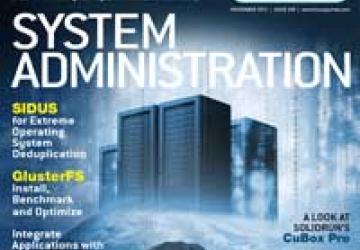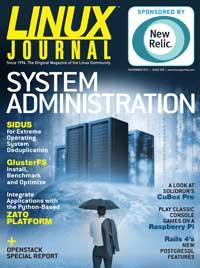November 2013 Issue of Linux Journal: System Administration


Here at Linux Journal, we love system administrators. Partially, that's because many of us are system administrators, but more than that, we all realize just how important sysadmins are to any organization—and how overlooked they usually are. This year, we decided to make two system administration-focused issues, because that's how much we care. (Also because system administration is one of the more popular topics, and a large percentage of our readers do some sort of sysadmin work. But, we do care. Really.)
Reuven M. Lerner starts off the issue with some awesome information about PostgreSQL and Ruby on Rails. With the latest version of Ruby on Rails, PostgreSQL has been integrated more closely than ever before. In a nerdy version of the "your chocolate is in my peanut butter" situation, Ruby on Rails is now far more yummy. Dave Taylor, on the other hand, whips out his scripting Kung-fu to update all the old URLs that broke when updating his content management system. CMSes are wonderful when it comes to delivering content, but moving between systems means dealing with the differences in how they create paths. Rahter than repost every article he's ever written, Dave modifies the URLs with scripts. And, he shows us how he does it.
Kyle Rankin and I both look at the lighter side of system administration this month. We didn't plan it, but perhaps it's a sign that every sysadmin needs a break from time to time. I covered my adventures with a CuBox computer, which is more powerful than a Raspberry Pi and about the size of a large ice cube. Whether you need a power-efficient server or a sleek XBMC unit with built-in IR, the CuBox is cool enough that I had to share. Kyle takes another stab at the Raspberry Pi this month, and he describes how to turn the little beasties into gaming machines. No, not those fancy new first-person-shooter type games, but real games, like the Nintendo Entertainment System. Get your nostalgia primed, and check out Kyle's experience with RetroPie. (And say goodbye to your weekend!)
Alex Davies and Alessandro Orsaria bring us back into the server room with their article on GlusterFS. As cloud computing drives bigger and bigger data centers, sometimes in our own server rooms, GlusterFS is one popular and powerful way to provide a distributed filesystem. Although many of us remember expanding storage by notching out the corner of a floppy disk, these days, petabytes of data can reside seamlessly across multiple servers. Alex and Alessandro explain how. Dariusz Suchojad follows them with his article on Zato, which is a platform for integrating Python into the cloud.
Next up this issue is SIDUS, which stands for Single-Instance Distributing Universal System. Emmanuel Quemener and Marianne Corvellec introduce us to this unique system that drastically reduces maintenance and installation time for new computer workstations. Not quite LTSP and not quite a fat client installation, SIDUS allows for the reuse of an operating system over the network. It's a fascinating concept and well worth the read. Then we finish the issue off with a special report on OpenStack. Every system administrator out there has at least heard of OpenStack, and in this report, Tom Fitfield provides a crash course in the technology. Whether you're an old hand or a newbie, Tom's information is invaluable to anyone interested in cloud computing.
We also have our regular assortment of product announcements, reviews, tips and vendor information in this issue. Heck, we even hand-pick our ads to find information that will be interesting and useful to our readers. Whether you're a system administrator or just an avid fan of Linux, this issue should entertain and inform. As for me, I'm planning to eat dessert first and give RetroPie a try. If my boss complains, I'll just blame Kyle.
Available to Subscribers: November 1










